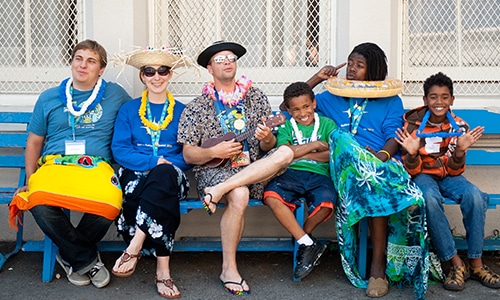Scheduling kids’ summers during middle school and early high school can be challenging. Eager for more independence but not quite ready for all the responsibilities of later teendom, kids are in a kind of limbo between elementary-aged camps and traditional summer jobs. Fortunately, a perfect middle ground exists in counselor-in-training (CIT) programs.
CITs (also known as leaders-in-training, staff-in-training or junior counselors) are usually between 8th and 10th grades—too old to be campers and too young to be staffers, but just right for taking on more responsibility and contributing in meaningful ways.
A well-run counselor-in-training program can boost kids’ confidence and teach a host of valuable skills. Read on for some basics about who should attend CIT programs, what they’ll do there, why they’re worth it and how to find the right one.
Who Should be a CIT?
A counselor-in-training program can be a good fit for all kinds of kids, but here are a few of the most likely candidates:
Loves kids
Most CIT programs offer opportunities to work with younger campers as leaders or mentors, a perfect fit for kids who love taking care of little ones or are interested in learning more about working in education.
Loves camp
It’s common for kids who love a particular camp as a camper to want to keep attending it in any capacity. Counselor-in-training programs offer a great way for them to evolve their relationship with a favorite camp and help deliver the experience they fell in love with to a new generation of campers.
Ready for responsibility
In addition to the two reasons above, kids can pursue CIT programs as ways to build important new skills in anything from operations to leadership.
What do Kids do in CIT Programs?
Counselor-in-training programs are as varied as the camps that offer them, but broadly, CITs spend the summer learning kid-management, operational and leadership skills and putting them into practice. Here are a few aspects most programs cover.
Working with kids
CITs both observe staff members and work alongside them, learning and practicing how to teach campers new skills, lead them in games or help them create projects.
They also have opportunities to support campers during more unstructured parts of the day like breaks or lunch, helping to enrich their camp experience without directly supervising them.
Camp operations
Counselors-in-training often get a behind-the-scenes peek at what it takes to run different aspects of camp, pitching in to help with camper check-in, lunch service, office organization and more.
CITs can lend a hand in planning and organizing large-scale events like all-camp games, closing ceremonies or talent shows.
Leadership skills
This category covers a breadth of important skills, including how to give and receive feedback, set and achieve goals, resolve conflict, speak to a large group, lead activities and plan and debrief multi-part events.
What does a specific CIT program look like?
Because it can be challenging to envision a counselor-in-training program if you’ve never experienced one, here’s a look at the activities CITs do in one day at our program, designed for rising 8th – 10th graders at Camp Galileo locations across the San Francisco Bay Area, Southern California, Chicagoland, Seattle, Washington DC and Denver:
Rotation 1
Counselors-in-training spend time with each other and a dedicated CIT leader. They build camaraderie through teamwork games and spend dedicated time learning leadership skills. Examples of those skills include: how to build a growth mindset, positive camper management, goal setting and effective communication methods.
Rotation 2
In this rotation, counselors-in-training choose which camper age group they’re most interested in working with (pre-K – K, 1st – 2nd grades, 3rd – 4th grades or 5th – 7th grades) and help mentor those campers as they design and create art and engineering projects.
Rotation 3
This rotation allows CITs to choose from four different tracks, this time in regard to camp operations. They can decide to lead outdoor games and events, participate in skits and ceremonies, create camp posters and props or help with logistics in the camp office.
Why should kids participate in a CIT program?
Experience
While CITs certainly provide a service to their camps, counselor-in-training programs are less about the work kids do and more about what working teaches them. CIT programs teach kids how to work efficiently and effectively—to show up every day and accomplish things, to set goals and see them through.
Exploration
Counselor-in-training programs are a way for kids to try out different types of roles, learning a little about their interests and strengths before they enter the working world.
Leadership
Beyond learning foundational skills like communication and organization, CITs start to elevate their thinking about the ways they can bring their unique strengths to the world at large.
Confidence
The responsibilities counselors-in-training take on at camp—in a safe, supported environment—help boost kids’ self-esteem and build their independence.
How do I pick the Right CIT Program?
Talk to your aspiring counselor-in-training.
Do they primarily want to work hands-on with kids? If so, what ages? Would they rather be working behind the scenes? Are they looking for a balance of both? Are there particular activities they do or don’t want to participate in? Not every program offers every option, so having a good sense for your child’s preferences will help you find the best fit, and help them get the most out of the experience.
Ask the program you’re considering some questions
Here are a few to get you started:
- How much of CITs’ time is kid-facing?
- Is there a curriculum for this program?
- What specific skills are CITs being taught?
- Is there a formal structure for the program? If so, what is it?
- Is there a designated staff member in charge of CITs?
- Can CITs attend multiple sessions of camp? If so, how will the experience be different from session to session?
How do I avoid a less-than-great program?
Confirm quality
A little research should confirm that the CIT program you’re considering is reputable or run through a well-regarded camp.
Seek out structure
CIT programs should certainly be fun, but they should also offer some structure. Engaging in thoughtfully scheduled activities led by consistent staff will greatly increase your child’s opportunities for meaningful learning.
Expect to get what you pay for
While a free program can be tempting, know that most CIT programs cost some money—and that’s a good sign! If a camp is investing in a counselor-in-training curriculum and dedicated staff to manage the program, it’s a good bet they’re aiming to offer an enriching, rewarding experience.
Any other tips?
If you can’t find a CIT program you love, reach out to your favorite local camp and ask them to start one. (Fun fact: Galileo started its program after years of parent requests.) Quality camps tend to build quality CIT programs.
Lobby your favorite camp to start their own counselor-in-training program.
If you can’t find a program you love, reach out to your favorite local camp and ask them to start one. (Case in point: Galileo started its program after years of parent requests.) Quality camps tend to build quality CIT programs.
From learning leadership skills to building confidence to having tons of fun, counselor-in-training programs are a great place for tweens and teens to come into their own.
Choose Camp Galileo for a summer adventure filled with creativity, exploration, and growth. Whether you’re interested in our Seattle summer camps, San Francisco Bay Area camps, Southern California camps, Chicagoland, Washington DC summer camps, or Denver summer camps, we’re here to make your child’s summer unforgettable.






